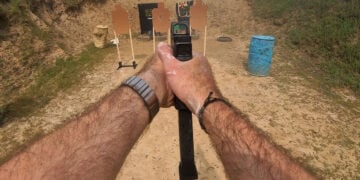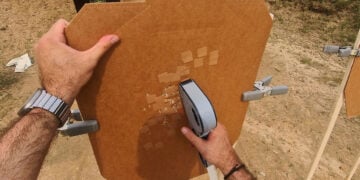Not just concealed carriers and gun owners but generally everyone will be confronted with a situation which could quickly elevate to violence. For responsible adults with obligations such as children, a home, and a reliable job, it’s not as easy to rationalize fighting someone when escape is an option.
It’s not “are you feeling lucky, punk,” it’s “is it worth it?”
It’s not a tough question, but it’s one I’m sure plenty of concealed carriers have had to ask themselves. It only gets more complicated — not less — when you have a gun strapped to your waist. It doesn’t take much for that gun to become dislodged or even accessible by your opponent. By that time, it’s too late.
Furthermore, if and when police arrive, they’re sure to be a lot more aggressively apprehensive about you and your opponent if they know or suspect one or both of you are armed.
A situation like this came up once for a close friend of mine. I’ll call him Nathan. Nathan is a firefighter in a local city in New Hampshire. His wife and his kid escaped a previously extremely abusive relationship, and the baby’s father still liked to show up to hockey practice on the West Side Arena to make a big deal. He would just show up, act menacing, stomp around, and stare.
Nathan recalled one time when he walked up to him, ostensibly to have a “civil conversation” and baby daddy inserted a casual, “how do you like those stretch marks I put on your woman?”
Now, some things in this world will raise the blood pressure of just about any red-blooded male. As only a guy listening to the story, I had to struggle to maintain my composure.
However, Nathan is a concealed carrier. He has a steady job where he can’t afford to have an assault charge under him. Nathan has a wife and a kid who depend upon him for his income. He has a home that he’d likely have to forfeit to pay for the costly legal fees associated with going to court. And last, but certainly not least, he always carries a gun on him.
The father, on the other hand, is a lanky, unemployed, balding 6’5″ dude with mental issues. Sadly, I remember seeing him at a barbecue a few months back. He stands to lose precisely nothing running his mouth and acting like a sketchy loon.
Nathan has everything to lose.
Nathan told me over a few beers in his garage that he wished with all his might he could have knocked the teeth out of that guy. Instead, he just stood his ground and brushed off the comment. He had to be the bigger man. More importantly, when his wife and her kid finished hockey practice, he had to get them out of there.
I don’t envy his situation, but I thought it was a great illustrative example of why a concealed carrier – specifically – has just a bit more to lose in an escalating situation than an unarmed person. Not saying the threat of violence is any less or the legal ramifications any less painful, but there is an added element: access to a firearm.
While Nathan, in this situation, had no duty to back down or walk away, he definitely couldn’t initiate violence despite, what I would call, clear provocation. This is something every concealed carrier should be mindful of when interacting with people who initiate provocation. The first action is costly.
Read More: De-escalation: An Essential Skill for Self-Defense









